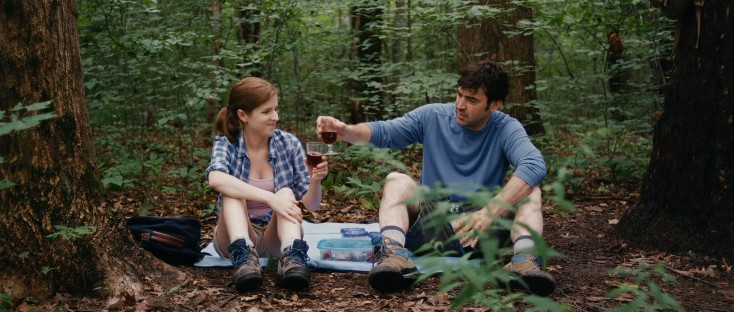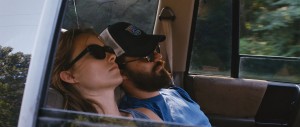(NOTE TO EDITORS: THE EMBARGO FOR “DRINKING BUDDIES” IS AUGUST 25 WHEN IT WILL BE AVAILABLE ON ITUNES/ON DEMAND. THERE IS NO EMBARGO FOR “SPECTACULAR NOW,” WHICH OPENS IN THEATERS AUGUST 2.)
By JAMES DAWSON
Front Row Features Film Critic
The weavingly meandering infidelity drama “Drinking Buddies” and the sloppily moody teen soap “The Spectacular Now” have one thing in common. Both could be used as public service announcements about the effects of alcohol consumption on relationships, careers and personal health and safety. Unfortunately, neither movie has much else to recommend it.
The two main characters in “Drinking Buddies” work in a craft brewery and rarely are seen without large glasses of beer in hand. All-purpose office employee Kate (a dressed down but still drop dead gorgeous Olivia Wilde) is the only female in the joint. Flirty, loud and always up for after-hours partying with the guys, she’s a little too touchy-feely with bearded and ball-cap wearing fellow employee Luke (Jake Johnson of TV’s “New Girl”). Although we apparently are supposed to regard Luke as a charmingly extroverted ladies’ man, he often comes across as crude, crass and kind of creepy.
Although Kate is in a relationship with the boringly mature Chris (Ron Livingston), she too blatantly has more fun with Luke, who happens to be living with his sorta fiancée Jill (an underused Anna Kendrick). When the two couples vacation together, the script contrives to pair the parties off with each other’s significant others to set up later conflict.
Alcoholism never is addressed, but nearly every scene of the movie (written and directed by Joe Swanberg) features big glasses of brewski as props. That makes it hard not to wonder if Kate might make fewer bad choices if she didn’t seem to reside in the Miller Time zone.
The problem with “Drinking Buddies” is that much of it seems improvised by actors who would be better off working from a script. Painfully long pauses, awkwardly disjointed conversations and arguments in which the participants choose completely different levels of intensity smack more of inadequate preparation than realism. Kate and Luke at one point resort to tossing pieces of food at each other during lunch, which may be cinema’s saddest last resort when it comes to depicting playful foreplay.
In “The Spectacular Now,” adapted by “(500) Days of Summer” writers Scott Neustadter and Michael H. Weber from the novel by Tim Tharp, the several-years-too-old Miles Teller impersonates John Cusack playing a joyless and perpetually flask-sipping version of Ferris Bueller. His character Sutter Keely is supposed to be 18, playboy savvy and universally popular at his high school, but with a morose undertone of no-future insecurity and abandonment issues.
When his girlfriend breaks up with him after a misunderstanding, Sutter hooks up with an angelically sweet nice-girl cipher named Aimee (Shailene Woodley of “The Descendants” and TV’s “The Secret Life of the American Teenager”). He thinks it’s only a fling and she won’t get hurt when it ends. She thinks it’s true love. You can guess the rest.
Back home, Sutter’s divorced mom won’t tell him how to contact his long-departed dad, a plot device that makes no sense in the Internet era. Sutter gets dad’s deets from his older sister and takes a road trip with Aimee to reconnect with the old man. Big drama ensues.
The oddest thing about the plot is that Sutter’s constant consumption of alcohol almost never is shown to affect his behavior, even though his fondness for his flask is his tragic flaw. His boss at a clothing store gives him an admonishment about being loaded on the job that seems to come out of nowhere. It’s not as if we’ve seen Sutter stumbling into the shirt display or vomiting on customers, in other words.
Directed by James Ponsoldt, “The Spectacular Now” adds a socially responsible “don’t drink and drive/date/be like dad” moral to the typical “high-school player finds romance with unaccountably overlooked wallflower” plot. But nobody here except the charmingly natural Woodley is even vaguely convincing, and the sluggish story becomes a melodramatic bore.






